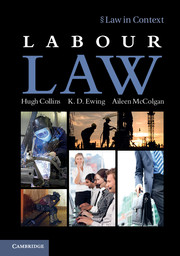Book contents
- Frontmatter
- Contents
- Preface
- Acknowledgments
- Table of cases
- Table of statutes
- Table of statutory instruments
- Table of European Union instruments
- Table of ILO instruments
- Table of other international instruments
- Abbreviations
- Part I Introduction
- Part II The contract of employment
- Part III Statutory regulation of the employment relationship
- Part IV Collective labour rights
- 12 Freedom of association and the right to organise
- 13 Freedom of association and trade union autonomy
- 14 The right to bargain collectively
- 15 The right to be informed and consulted
- 16 Collective action and the right to strike
- 17 Liability for collective action
- Part V Termination of employment
- Index
- References
13 - Freedom of association and trade union autonomy
from Part IV - Collective labour rights
- Frontmatter
- Contents
- Preface
- Acknowledgments
- Table of cases
- Table of statutes
- Table of statutory instruments
- Table of European Union instruments
- Table of ILO instruments
- Table of other international instruments
- Abbreviations
- Part I Introduction
- Part II The contract of employment
- Part III Statutory regulation of the employment relationship
- Part IV Collective labour rights
- 12 Freedom of association and the right to organise
- 13 Freedom of association and trade union autonomy
- 14 The right to bargain collectively
- 15 The right to be informed and consulted
- 16 Collective action and the right to strike
- 17 Liability for collective action
- Part V Termination of employment
- Index
- References
Summary
Introduction
As discussed in Chapter 12, the right to freedom of association has several dimensions, including the freedom to be in association with others. It also includes the freedom of the association to govern and administer its own internal affairs, in accordance with the wishes of the members. This is the principle of trade union autonomy, also acknowledged by international law, notably in ILO Convention 87, Article 3.
ILO Convention 87, Article 3
Workers’ and employers’ organisations shall have the right to draw up their constitutions and rules, to elect their representatives in full freedom, to organise their administration and activities and to formulate their programmes.
The principle of trade union autonomy contained in Article 3 is a recognition that self-government is an important end in itself: it should be for workers and not the state to decide how their organisations are to be organised, structured and administered. But it is also a recognition that intrusive regulation of trade union affairs by the state can be debilitating, and undermine the ability of the trade union to perform the functions for which it was created. This is not to deny that there is a role for the state in supervising the activities of trade unions. But, while the ILO supervisory authorities accept that certain restrictions on trade union freedom may be permissible, they also accept that trade unions should not be so burdened by regulation as to be unable most effectively to promote the interests of those they represent.
- Type
- Chapter
- Information
- Labour Law , pp. 490 - 536Publisher: Cambridge University PressPrint publication year: 2012



